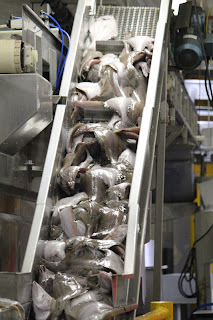ISA – International Seafoods of Alaska – was kind enough to
let a bunch of fish geeks inside for a tour.
It’s definitely not set up for tours, so I doubt they give them
regularly. We were a group of about 18,
and totally in the way down on the processing floor. There were forklifts moving huge orange
plastic bins of fish around and you had to keep your eyes open to stay out of
their way. I was very impressed with the
whole process – very clean, little waste, super efficient, and fast. The processor handles fish only (as opposed to shellfish) and were processing
pacific cod, arrowtooth flounder and several other species of flatfish while we
were there. They can process 300,000 to
700,000 pounds of fish PER DAY, depending on the species. The guide said there were two crews of 80-90
people working around the clock. It was
really, really cool, and my favorite tour.
Seeing how the fish are processed made me happy – I would still eat
seafood after seeing how it’s all handled and processed. I wonder if I would say the same after a
slaughterhouse tour? Probably not. Actually, I think it would be good to see
more about how the foods I eat are processed.
I may make that a new goal.
Also, I should note that the processing process isn’t at all
like I imagined it would be. For some
reason I thought it would be a more…linear…process with fish going in one side
then moving down a loooong straight line from step to step. It wasn’t.
It wasn’t exactly a maze, but there were different centers of activity (which
makes sense and mostly shows my naivety, really). And I never, ever would have guessed that
there would be a machine that could take a whole fish and pull out two nearly
perfect looking fillets with seemingly nill waste. Amazing.
Some photos and brief explanations:
Sorting fish by species and size. They come past on a conveyor belt and the
staff pick out their assigned species or species/size combination, then drop
them into bins. Bins are moved to the
next station (species specific processing techniques, of course, flatfish are
handled different from say, cod).
Sorted bins of (I think) arrowtooth flounder and pacific cod
A couple of workers holding up fish for me to photograph. The staff seemed very welcoming and willing
to share their work.
Fish moving up a belt for processing
After being filleted by a machine, the cod (and other
species perhaps) were trimmed by hand
Then fish fillets were packed and frozen, or frozen
individually and packed. Our flight off
the island had a couple of pallets of fresh (not frozen) fillets loaded aboard,
headed for the lower 48. It looked like
most of the fish was frozen but some was shipped fresh.










No comments:
Post a Comment